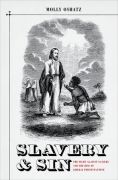
Slavery and sin: the fight against slavery and the rise of liberal protestantism
Oshatz, Molly
Molly Oshatz reveals the antislavery origins of liberal Protestantism, arguing that the antebellum slavery debates forced antislavery Protestants to develop new understandings of truth and morality and apply the theological lessons of antislavery to the challenges posed by evolution and historical biblical criticism. In a groundbreaking examination of the antislavery origins of liberalProtestantism, Molly Oshatz contends that the antebellum slavery debates forced antislavery Protestants to adopt an historicist understanding of truth and morality. Unlike earlier debates over slavery, the antebellum slavery debates revolvedaround the question of whether or not slavery was a sin in the abstract. Unable to use the letter of the Bible to answer the proslavery claim that slavery was not a sin in and of itself, antislavery Protestants, including William Ellery Channing, Francis Wayland, Moses Stuart, Leonard Bacon, and Horace Bushnell, argued that biblical principles opposed slavery and that God revealed slavery's sinfulness through thegradual unfolding of these principles. Although they believed that slavery was a sin, antislavery Protestants' sympathy for individual slaveholders and their knowledge of the Bible made them reluctant to denounce all slaveholders as sinners. In order to reconcile slavery's sinfulness with theircommitments to the Bible and to the Union, antislavery Protestants defined slavery as a social rather than an individual sin. Oshatz demonstrates that the antislavery notions of progressive revelation and social sin had radical implications for Protestant theology. Oshatz carries her study through the Civil War to reveal how emancipation confirmed for northern Protestants the antislavery notion that God revealed His will through history. She describes how after the war, a new generation of liberal theologians, including Newman Smyth, Charles Briggs, and George Harris, drew on the example of antislavery and emancipation to respond to evolution andhistorical biblical criticism. The theological innovations rooted in the slavery debates came to fruition inliberal Protestantism's acceptance of the historical and evolutionary nature of religious truth. AcknowledgementsIntroduction1. The Early Slavery Debates2. Antislavery Moderation3. The Antebellum Slavery Debate4. Social Sin5. God in History6. The New TheologyConclusionNotes
- ISBN: 978-0-19-975168-6
- Editorial: Oxford University
- Encuadernacion: Cartoné
- Páginas: 208
- Fecha Publicación: 15/12/2011
- Nº Volúmenes: 1
- Idioma: Inglés
